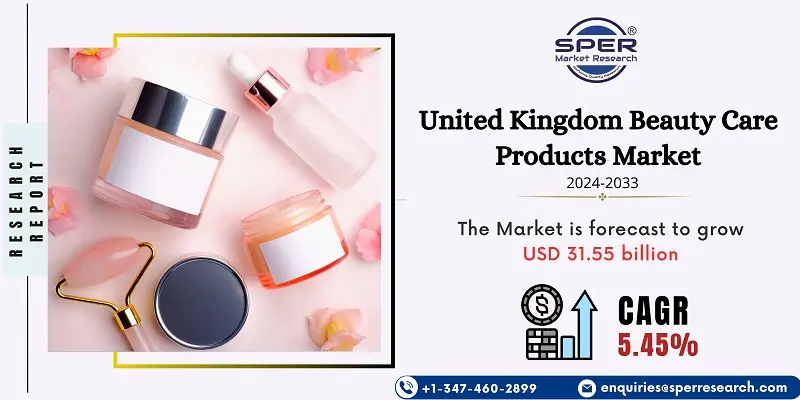
United Kingdom Beauty Care Products Market Growth, Size, Trends, Demand and Future Outlook
United Kingdom Beauty Care Products Market Size- By Product Type, By Sales Channel, By Origin- Regional Outlook, Competitive Strategies and Segment Forecast to 2033
| Published: Jun-2024 | Report ID: FMCG24113 | Pages: 1 - 102 | Formats*: |
| Category : Consumer & Retail | |||
- February 2023; ‘Stress Facce,’ a moisturizer created especially for stressed skin, introduced by a United Kingdom based brand Faace. This product is painstakingly made with essential oils and plant based components. It offers calming effects and successfully reduces skin tension.
- January 2022; In the UK, Cult Beauty introduced its well-known brand, Necessaire. This prestigious brand meets a variety of skincare needs with a wide selection of body care products, such as body wash, body lotion, body serums, and more.


| Report Metric | Details |
| Market size available for years | 2020-2033 |
| Base year considered | 2023 |
| Forecast period | 2024-2033 |
| Segments covered | By Product Type, By Sales Channel, By Origin |
| Regions covered | London, East Anglia, Southwest, Southeast, Scotland, East Midlands, Yorkshire and Hamberside |
| Companies Covered | Charlotte Tilbury, Crabtree and Evelyn, Elemis, Jo Malone London, Liz Earle, Lush, Molton Brown, Neal’s Yard Remedies, Ren Clean Skincare, Others. |
- Beauty Influencers
- Luxury Consumers
- Ethnic and Cultural Groups
- Patients with specific skin or hair concerns
- Health Conscious Consumers
- Fitness Enthusiasts
| By Product Type: |
|
| By Sales Channel: |
|
| By Origin: |
|
| By Region: |
|
- United Kingdom Beauty Care Products Market Size (FY’2024-FY’2033)
- Overview of United Kingdom Beauty Care Products Market
- Segmentation of United Kingdom Beauty Care Products Market by Product Type (Face Care, Face Toners, Mist, Hand Creams, Body Lotions)
- Segmentation of United Kingdom Beauty Care Products Market by Sales Channel (Supermarkets/Hypermarkets, Multi Branded Stores, Exclusive Stores, Online, Other)
- Segmentation of United Kingdom Beauty Care Products Market by Origin (Conventional, Organic)
- Statistical Snap of United Kingdom Beauty Care Products Market
- Expansion Analysis of United Kingdom Beauty Care Products Market
- Problems and Obstacles in United Kingdom Beauty Care Products Market
- Competitive Landscape in the United Kingdom Beauty Care Products Market
- Impact of COVID-19 and Demonetization on United Kingdom Beauty Care Products Market
- Details on Current Investment in United Kingdom Beauty Care Products Market
- Competitive Analysis of United Kingdom Beauty Care Products Market
- Prominent Players in the United Kingdom Beauty Care Products Market
- SWOT Analysis of United Kingdom Beauty Care Products Market
- United Kingdom Beauty Care Products Market Future Outlook and Projections (FY’2024-FY’2033)
- Recommendations from Analyst
1.1. Scope of the report1.2. Market segment analysis
2.1. Research data source
2.1.1. Secondary Data2.1.2. Primary Data2.1.3. SPER’s internal database2.1.4. Premium insight from KOL’s
2.2. Market size estimation
2.2.1. Top-down and Bottom-up approach
2.3. Data triangulation
4.1. Driver, Restraint, Opportunity and Challenges analysis
4.1.1. Drivers4.1.2. Restraints4.1.3. Opportunities4.1.4. Challenges
4.2. COVID-19 Impacts of the United Kingdom Beauty Care Products Market.
5.1. SWOT Analysis
5.1.1. Strengths5.1.2. Weaknesses5.1.3. Opportunities5.1.4. Threats
5.2. PESTEL Analysis
5.2.1. Political Landscape5.2.2. Economic Landscape5.2.3. Social Landscape5.2.4. Technological Landscape5.2.5. Environmental Landscape5.2.6. Legal Landscape
5.3. PORTER’s Five Forces
5.3.1. Bargaining power of suppliers5.3.2. Bargaining power of buyers5.3.3. Threat of Substitute5.3.4. Threat of new entrant5.3.5. Competitive rivalry
5.4. Heat Map Analysis
6.1. United Kingdom Beauty Care Products Market Manufacturing Base Distribution, Sales Area, Product Type6.2. Mergers & Acquisitions, Partnerships, Product Launch, and Collaboration in United Kingdom Beauty Care Products Market
7.1. United Kingdom Beauty Care Products Market Size, Share and Forecast, By Product Type, 2020-20267.2. United Kingdom Beauty Care Products Market Size, Share and Forecast, By Product Type, 2027-20337.3. Face Care7.4. Face Toners7.5. Mist7.6. Hand Creams7.7. Body Lotions
8.1. United Kingdom Beauty Care Products Market Size, Share and Forecast, By Sales Channel, 2020-20268.2. United Kingdom Beauty Care Products Market Size, Share and Forecast, By Sales Channel, 2027-20338.3. Supermarkets/Hypermarkets8.4. Multi Branded Stores8.5. Exclusive Stores8.6. Online8.7. Other
9.1. United Kingdom Beauty Care Products Market Size, Share and Forecast, By Origin, 2020-20269.2. United Kingdom Beauty Care Products Market Size, Share and Forecast, By Origin, 2027-20339.3. Conventional9.4. Organic
10.1. United Kingdom Beauty Care Products Market Size and Market Share
11.1. United Kingdom Beauty Care Products Market Size and Market Share By Region (2020-2026)11.2. United Kingdom Beauty Care Products Market Size and Market Share By Region (2027-2033)11.3. London11.4. East Anglia11.5. Southwest11.6. Southeast11.7. Scotland11.8. East Midlands11.9. Yorkshire and Hamberside
12.1. CHARLOTTE TILBURY
12.1.1. Company details12.1.2. Financial outlook12.1.3. Product summary12.1.4. Recent developments
12.2. CRABTREE AND EVELYN
12.2.1. Company details12.2.2. Financial outlook12.2.3. Product summary12.2.4. Recent developments
12.3. ELEMIS
12.3.1. Company details12.3.2. Financial outlook12.3.3. Product summary12.3.4. Recent developments
12.4. JO MALONE LONDON
12.4.1. Company details12.4.2. Financial outlook12.4.3. Product summary12.4.4. Recent developments
12.5. LIZ EARLE
12.5.1. Company details12.5.2. Financial outlook12.5.3. Product summary12.5.4. Recent developments
12.6. LUSH
12.6.1. Company details12.6.2. Financial outlook12.6.3. Product summary12.6.4. Recent developments
12.7. MOLTON BROWN
12.7.1. Company details12.7.2. Financial outlook12.7.3. Product summary12.7.4. Recent developments
12.8. NEAL’S YARD REMEDIES
12.8.1. Company details12.8.2. Financial outlook12.8.3. Product summary12.8.4. Recent developments
12.9. REN CLEAN SKINCARE
12.9.1. Company details12.9.2. Financial outlook12.9.3. Product summary12.9.4. Recent developments
12.10. Others
SPER Market Research’s methodology uses great emphasis on primary research to ensure that the market intelligence insights are up to date, reliable and accurate. Primary interviews are done with players involved in each phase of a supply chain to analyze the market forecasting. The secondary research method is used to help you fully understand how the future markets and the spending patterns look likes.
The report is based on in-depth qualitative and quantitative analysis of the Product Market. The quantitative analysis involves the application of various projection and sampling techniques. The qualitative analysis involves primary interviews, surveys, and vendor briefings. The data gathered as a result of these processes are validated through experts opinion. Our research methodology entails an ideal mixture of primary and secondary initiatives.



Frequently Asked Questions About This Report
PLACE AN ORDER
Year End Discount
Sample Report
Pre-Purchase Inquiry
NEED CUSTOMIZATION?
Request CustomizationCALL OR EMAIL US
100% Secure Payment






Related Reports
Our Global Clients
Our data-driven insights have influenced the strategy of 200+ reputed companies across the globe.




















